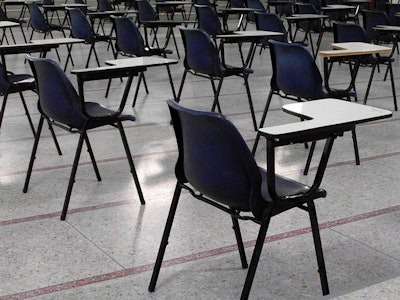More than half of university presidents are “very likely” to allow in-person classes for at least some period of time this fall, says a recently released American Council on Education (ACE) survey.
The survey, which polled 310 college presidents and closed May 11, also revealed that more than half of leaders at residential universities say they are “very likely” to reopen campus housing for at least some portion of the fall term.
With much uncertainty continuing to cloud the future of the higher education landscape because of the COVID-19 pandemic, ACE last month began a year-long “Pulse Point” survey series to compile a month-by-month record of how higher education leaders’ thought processes are evolving alongside the COVID-19 pandemic.

Turns out, the survey found that state governors held the most sway, with 75% of presidents saying governors had “high levels” of influence on whether to reopen. After governors, state health departments had a high influence on 72% of presidents and the Centers for Disease Control had a high influence on 63% of presidents. Opinions of students and families carried notable weight too, with nearly 38% of college presidents saying they have a “high level” of influence.
That means, in the coming months, university presidents will find themselves balancing the recommendations of these various groups, from students to state leaders, while deciding if, how and when to reopen campuses. And often, these stakeholders, even among themselves, want different things.
For instance, a poll this month of 835 students from various institutions showed that 65% said they would attend in-person classes in the fall, even if no COVID-19 vaccine were available by then. And at Harvard University, students have been advocating against an online only fall semester, with more than 500 students petitioning for the school to postpone the semester instead of going fully online.
Additionally, aside from what different stakeholders want, an institution’s decision to reopen will also depend on what state budgets and tuition revenues will look like in the coming months. According to the ACE survey, enrollment numbers as well as long-term financial viability sat among the top three “most pressing issues” for university presidents.
As ACE reported, a majority of presidents (67%) expect their fall 2020 enrollment to be lower than their fall 2019 enrollment, and 80% of presidents say they anticipate the global pandemic will decrease their institutions’ revenue in the next fiscal year.
Just this week, for instance, Stanford University announced that it expects a $267 million “negative financial impact” from COVID-19 for the March-August period alone.
Still, what college presidents think today could change dramatically a week, or even days, from now. As ACE notes, “circumstances surrounding the pandemic are 
For now, ACE’s May survey found that about 22% of presidents anticipate announcing their fall term plans by May 31; 36% anticipate announcing by June 30; 8% anticipate announcing by July 31; and 15% remain “unsure” of when they will announce fall plans.
Meanwhile, on Thursday, ACE joined dozens of other higher education groups in urging Congress to enact temporary liability protections for higher education institutions making such decisions. According to Dr. Ted Mitchell, ACE’s president, potential lawsuits would cast a “chilling effect” on an institution’s decision making.
“As colleges and universities assess how quickly and completely campuses can resume full operations, they are facing enormous uncertainty about COVID-19-related standards of care and corresponding fears of huge transactional costs associated with defending against COVID-19 spread lawsuits, even when they have done everything within their power to keep students, employees, and visitors safe,” Mitchell wrote in the letter to Congress.





















